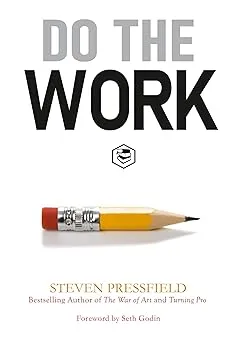About this book
Five Key Takeaways
- Resistance is a universal foe everyone must confront.
- Trust instincts and let go of rational overthinking.
- Start projects immediately, despite feeling unprepared.
- Prioritize action over excessive planning and research.
- Courage and commitment are essential to completing projects.
-
Resistance Is a Universal Adversary
Resistance is an invisible yet powerful force that hinders progress in goals requiring commitment and courage (Chapter 1).
It manifests as fear, procrastination, or self-doubt, intensifying when tasks are significant. It thrives on distraction and delay.
Understanding that Resistance is impersonal can free people from self-blame and help redirect their focus toward overcoming it.
This force impacts everyone: artists, entrepreneurs, and anyone striving for meaningful achievements. It’s a shared struggle across humanity.
However, its presence can serve as a compass. The stronger the Resistance, the more important the goal typically is.
Recognizing Resistance as constant reframes it as part of the creative process, empowering persistence and resilience.
Overcoming it isn’t just about talent; it’s about sustained effort and bravery against this force. Each triumph builds momentum.
Ultimately, Resistance challenges individuals to become stronger, fostering growth and achieving potential through persistence.
-
Rationality Restrains Creativity
Traditional logic and excessive rationality often block creativity. Overthinking leads to hesitation and disconnection from instinctual inspiration.
Creators tend to overanalyze, which undermines spontaneity and genuine connection with their craft, stalling progress or diluting originality.
This issue limits creators' authenticity, preventing transformative ideas and genuine innovation, which flourish outside rigid frameworks of thought.
The book suggests trusting your instinctual Self—a state of intuitive action that leads to more sincere and evocative results.
The author frames "trusting the unknown" ("the soup") as crucial to creation, even when that means leaning into uncertainty and disorder.
This perspective on creativity surpasses rational analysis, fostering breakthrough moments that rigid thought patterns obstruct.
By embracing imperfection and action, creators tap into their unique vision, which resonates more deeply with their audience.
Ultimately, trusting instincts unlocks creative potential, showing how meaningful outcomes arise from faith, not control (Chapter 3).
-
Begin Before You’re Ready
The biggest barrier to starting projects often isn’t skill—it’s internal Resistance creating excuses and perfectionist fears.
Pressfield advises starting boldly despite feelings of unpreparedness. Take deliberate action instead of waiting for perfect conditions.
This spark of action combats inertia and begins building momentum, which generates energy and fuels creative breakthroughs.
Overcoming fears that prevent starting solidifies commitment to your goals, opening unexpected paths and opportunities.
The courage gained from taking the first step amplifies your trust in yourself. Each bold move builds mental strength.
Initiating projects in this way fosters confidence and uncovers solutions that preparation alone could never achieve.
By embracing the discomfort of beginning, you align creativity with momentum and set yourself on a productive trajectory.
-
Overpreparation Turns into Resistance
Excessive research becomes a form of Resistance, delaying action and stifling creativity's natural flow (Chapter 4).
While some preparation is necessary, prioritizing action over endless readiness better suits the chaotic, instinct-driven creative process.
This taps into the subconscious to produce authentic results, as overpreparing often leads to burnout or loss of focus.
Engaging actively with the project from the outset allows exploration and innovation that theory alone can’t replicate.
Structured spontaneity—like drafting minimal outlines—helps creators navigate uncertainty without over-reliance on rigid plans or research.
Adopting this approach channels raw, inventive energy into the work itself. It sidesteps common paralysis caused by analysis.
Ultimately, excessive preparation wastes time, while trusting action cultivates creative intuition and genuine growth.
This approach balances structure with freedom, allowing creators to avoid procrastination traps and achieve meaningful progress.
-
Failures Foster Growth
Creative setbacks, or "crashes," can feel devastating but represent crucial opportunities for reflection and improvement.
The process of analyzing what went wrong can reveal flaws, refine processes, and expand one’s skillset significantly.
Far from mere failure, these moments push creators to confront discomfort zones, sparking progress and eventual breakthroughs.
The book considers crashes essential stepping stones in forging stronger work practices and adapting methods productively.
By reinterpreting crashes as natural growth moments, creatives improve resilience and better navigate future obstacles.
However challenging these instances may feel, they often ignite reimagination, unearthing lessons central to development.
This perspective shifts creators’ relationships with failure, framing it as a transformative rather than discouraging experience.
Ultimately, resilience built during crashes fuels maturity, creativity, and confidence for future projects (Chapter 7).
-
Finish and Ship Your Work
Finishing creative projects presents a unique challenge: fear of judgment often surges just before completion.
Pressfield emphasizes the courage required to "ship" work despite fears of rejection. Face those anxieties directly.
Prepare yourself mentally: Resistance peaks near the finish. Anticipating this empowers persistence over self-doubt.
By sharing imperfect work, creators learn resilience, encounter constructive feedback, and begin evolving from real-world responses.
Once published, creators transcend internal fears, affirming the value of taking risks and promoting personal growth.
This practice builds momentum—each finished project reinforces confidence, making future efforts feel less daunting.
Remember: success lies not in perfection but in proving to yourself you can start, complete, and share meaningful accomplishments.
-
Action Attracts Unexpected Assistance
Commitment to creation activates Assistance, an opposite force to Resistance (Chapter 6).
Assistance manifests creatively, offering new ideas, opportunities, and support from collaborators once work begins with dedication.
Truthful engagement in projects aligns creators with their passions and external influences that share their values.
This energy fosters internal breakthroughs and sparks connections with like-minded individuals aligned with the creator's vision.
Persistent effort generates synchronicities that drive plans forward, turning allies into significant drivers of success.
Recognizing and utilizing Assistance fuels momentum. Combined with action, it reduces isolation and bolsters creative courage.
As inner clarity grows, external pathways emerge. Dedication transforms passions into tangible, supported realities.
Ultimately, Assistance affirms creativity’s joy. It validates effort and symbolizes the collective power of dedicated work.




















